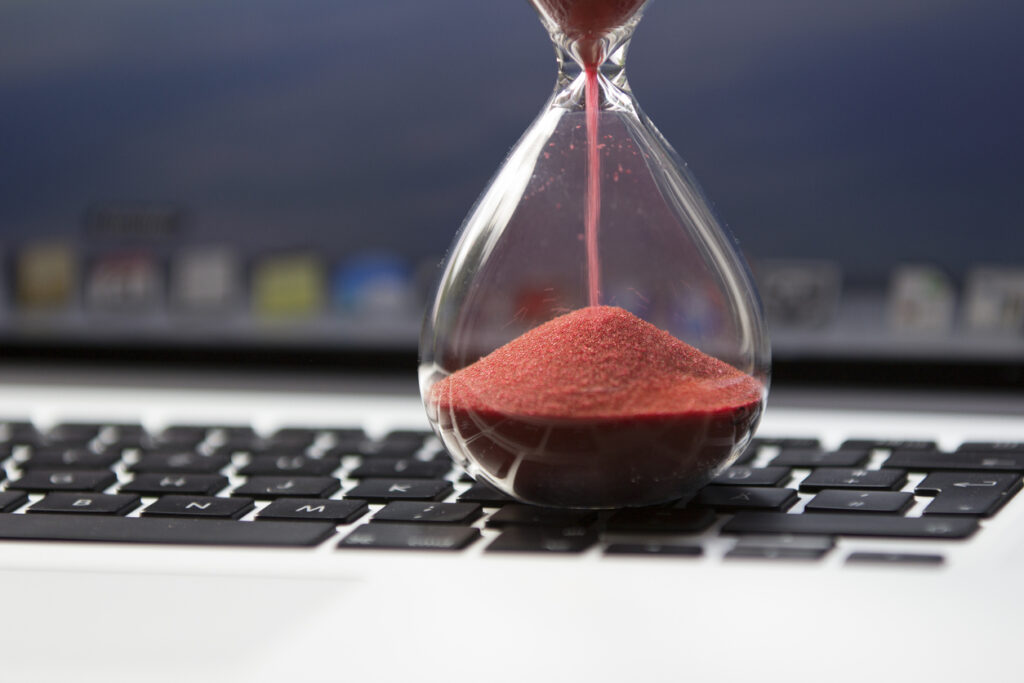We know the importance of ensuring your IT hardware, software and systems are secure, efficient and productive, but as businesses look to reduce operating costs following recent inflation and energy price hikes, decreased budgets are likely to mean that organisations delay their planned upgrade cycles for redundant IT equipment. But delays to hardware refresh rotations can have significant, and often hidden costs. As a laptop or desktop becomes less and less efficient over time, the tell-tale warning signs start to appear – it’s slower to start or shut down, it’s painfully slow when you ask it to multi-task and you are sat watching that spinning wait cursor far longer than you’d like. Over time, a steady decline in performance can result in a considerable, cumulative impact throughout the business.
What is the cost of using outdated business technology?
Lost productivity.
As you might expect, the biggest impact of a slow computer is financial loss through lost efficiency; costing the UK economy billions of pounds each year.
Slow workstations are said to drop productivity by 2.75%. The equivalent of 5.5 days per year in wasted time – per employee.
Tech Lounge.
If legacy equipment slows an employee down by 5 minutes an hour, during a 7.5-hour working day, lost productivity would amount to over 3 hours a week. That mounts up fast if you have multiple workers experiencing delays. We’ve all resorted to the troubleshooting ‘turn it off and on again’ fix, but in itself, this can lose over ten minutes. It is unlikely that you would suddenly hand your team an additional week’s annual leave per year, but this is the equivalent of lost time.
Increased energy use.
Older models are less energy-efficient than their successors, so they’ll cost more to run. In addition, their laptop batteries are less likely to hold their charge. At a time when everyone is looking to limit their bills, this not only increases energy costs but also the corporate carbon footprint.
Increased security risk.
The level of threat from cyber-attacks has increased exponentially in the last two years. The older the technology, the less security it will have; this makes it and by extension your business, highly vulnerable. Cyber-criminals are well-aware of legacy system weaknesses that can be exploited in order to infiltrate your network. A resulting data breach could result in financially crippling fines if you fall foul of EU and UK GDPR or FCA compliance along with inevitable damage to your reputation. Some legislation requires you to update your technology to protect company data.
Low employee morale.
Whilst the impact on work production will reduce business profit, a slow computer can be exceptionally frustrating, resulting in a lack of employee motivation and morale. If they don’t feel valued by not having the right tools for the job, you might lose a good member of your team and have additional recruitment and training costs, whilst their replacement gets up to speed.
Research has suggested that a computer wait time of just two seconds breaks concentration and productivity*

How to fix a slow laptop?
You’ve had a good old fashioned clear out of old files cluttering up your hard drive, you’ve deleted temporary files and disabled unnecessary start-up programmes and that laptop still isn’t performing effectively. However, there’s no need to buy a new device just yet. There are cost-effective ways to improve the speed of an unresponsive laptop and extend the lifecycle of existing technology. Effective lifecycle management through reliable third-party providers, such as IT asset disposition services, can help to quickly identify the leading causes of unresponsiveness and poor performance.
Check for malware.
If the device is suddenly experiencing operational issues, programs are crashing or there are pop-up ads appearing, this can be a sign that your machine has been compromised by malware, spyware or another virus. Despite the best efforts of CISOs and CIOs, malware remains extremely prevalent and it is still easy to fall victim. Whether this affects your device’s memory or spreads to other files, few things slow a laptop faster.
Upgrade your storage drive and RAM.
If your laptop is over three years old, it’s likely it will have a mechanical hard disk drive, (HDD). These are far slower than the superseding solid-state drive, which accesses stored data digitally using memory chips. Over time the data on the HDD spinning disk becomes fragmented, scattering data throughout the disk. It will then take longer to look for the information requested – much like rummaging through a disorganised filing cabinet to find a document. A SDD accesses the data digitally so fragmentation doesn’t occur. Whilst the defragmentation or defragging process can help HDD speed in the short term by regrouping data, upgrading to a SSD will not only reduce energy consumption and increase speed dramatically but there have been significant improvements in solid-state drive security, too. A drive upgrade can make the device feel new again and is far more cost-effective than a new machine. Similarly, by upgrading your laptop’s memory, or RAM, it will have renewed ability to multi-task, have an improved response time and will effortlessly switch from one open program to another. As the software we use becomes increasingly advanced and resource-hungry, slow RAM is a common problem with ageing computers as it is unable to manage several applications at once.
Upgrade the operating system.
When upgrading the RAM, it is worth double-checking the OS version of older devices. For example, the 32-bit Windows OS can only recognise a maximum 3GB RAM upgrade. Additional memory will remain unused. If this is the case, your ITAD partner could help by upgrading your OS by completing a fresh install. As manufacturer technical support, updates, bug fixes and patches are only available for a limited time, it’s never a bad idea. Despite knowing the inherent security risk, surprisingly, there are still thousands of UK businesses running obsolete operating systems such as Windows 7. Even if you are running Windows 8, it’s definitely time to upgrade to 10 at the minimum; this will boost performance and prevent data governance issues. Whether Mac or Windows OS, your employees should avoid hitting snooze on those regular updates that keep you more secure and ensure your system runs a little faster.

Delete Bloatware.
Bloatware, as the name suggests refers to unwanted pre-installed software, such as weather apps, navigation and music players. Manufacturers use these to provide a higher perceived value at point-of-sale but bloatware is associated with degrading performance as the software hogs your storage space and can take an age to boot up. As bloatware is rarely updated it also poses a security risk. These hide in the background and are often difficult to find but your ITAD supplier will be able to help you identify and delete unnecessary applications. After all, solitaire is unlikely to be needed for your business operations.
Upgrade and recycle.
Processors, storage, security and reliability have all improved. However, as costs have fallen, our upgrade cycles have increased as has our IT asset disposal; increasing the demand for the earth’s resources being mined each year to produce replacement devices. Yet the precious metals and other perfectly serviceable components can be retrieved and reused. When devices are upgraded or once they really do become end of life IT assets, their elements can be retrieved by IT asset disposal services. Through asset recovery, businesses receive the residual value for these, effectively they are still able to sell redundant IT assets. By doing so through trusted data destruction services, you’ll know data erasure has been completed professionally and has a full ITAD chain of custody as every piece of redundant IT equipment will receive its own IT asset disposal accreditation certificate.

The demands we make on our business technology have hugely increased with today’s intensive, data-driven systems – as such, our devices seem to slow faster than ever. But effective lifecycle management and component upgrades can work wonders on an older system. This prevents the need to purchase new devices whilst ensuring business efficiency is not affected by lost productivity. It will help the overall bottom line of your organisation by making substantial cost savings, but you’ll also maximise your investment and the lifetime value of the device itself. When partnering with an accredited IT asset disposition company, you will also be demonstrating your commitment to sustainable working practices, the circular economy and the reduction of e-waste through environmentally friendly ITAD; an essential focus for all growing businesses. * Bandicoot
tier1 Group provides full lifecycle management and upgrade facilities, alongside comprehensive environmentally friendly ITAD and data centre decommissioning services to help businesses avoid future data security issues. Tell us about your data governance challenges – contact us on 0161 777 1000 (Manchester), 01621 484380 (Maldon) or visit www.tier1.com/contactus
Resources. Technize, Bandicoot, Modern Networks, Space Hop, Tech Target, Clario, Netstar, Hello Tech, Klim Tech, Crucial.



